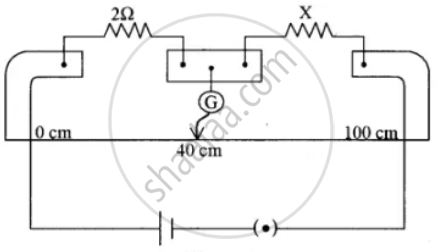Advertisements
Advertisements
प्रश्न
Three bulbs B1 (230V, 40W), B2 (230V, 60W) and B3 (230V, 100W) are connected in series to a 230V supply. Which bulb glows the brightest?
उत्तर
The bulb B1 (230V, 40W) will glow the brightest when connected in series with B2 and B3 because the resistance `(R = V^2/P)` is highest for B1.
APPEARS IN
संबंधित प्रश्न
Suppose you have three resistors, each of value 30 Ω. List all the different resistances you can obtain using them.
Two resistances R and 2R are connected in parallel in an electric circuit. The thermal energy developed in R and 2R are in the ratio _______________ .
A bulb is made using two filaments. A switch selects whether the filaments are used individually or in parallel. When used with a 15 V battery, the bulb can be operated at 5 W, 10 W or 15 W. What should be the resistances of the filaments?
Two resistors of equal resistances are joined in series and a current is passed through the combination. Neglect any variation in resistance as the temperature changes. In a given time interval,
(a) equal amounts of thermal energy must be produced in the resistors
(b) unequal amounts of thermal energy may be produced
(c) the temperature must rise equally in the resistors
(d) the temperature may rise equally in the resistors
In a meter bridge circuit, resistance in the left-hand gap is 2 Ω and an unknown resistance X is in the right-hand gap as shown in the figure below. The null point is found to be 40 cm from the left end of the Wire. What resistance should be connected to X so that the new null point is 50 cm from the left end of the wire?

A solenoid L and a resistor R are connected in series to a battery, through a switch. When the switch is put on, current I flowing through it varies with time t as shown in which of the graphs given below:
If two resistors of resistances R1 = (4 ± 0.5) Ω and R2 = (16 ± 0.5) Ω are connected in series. The eqivalent resistance with the limits of percentage error is ______.
Two electric lamps of each 40 watt are connected in series. The power consumed by the combination will be
Let there be n resistors R1............Rn with Rmax = max (R1......... Rn) and Rmin = min {R1..... Rn}. Show that when they are connected in parallel, the resultant resistance RP < R min and when they are connected in series, the resultant resistance RS > Rmax. Interpret the result physically.
A wire of uniform cross-section and resistance 4 ohms is bent in the shape of square ABCD. Point A is connected to point P on DC by a wire AP of resistance 1 ohm. When a potential difference is applied between A and C, the points B and P are seen to be at the same potential. What is the resistance of the part DP?

